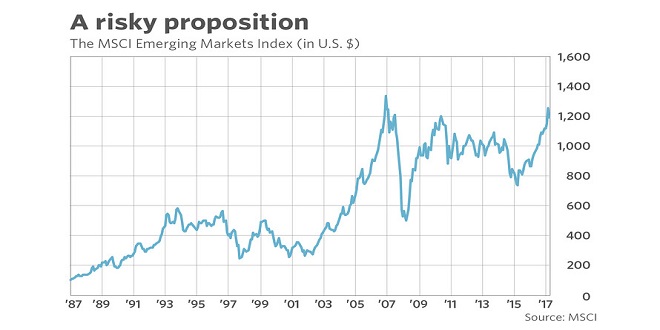Emerging Market Equities for Retirement Portfolios

Is it worth investing in emerging marketing equities? Wall Street experts believe so. Emerging-market stocks have outperformed developed market shares over the past year making them attractive options for retirement portfolios. GMO in Boston, one of the largest investment firms, projects that emerging market equity will outperform inflation by 5% over seven years.
However, reality paints a very different picture. FactSet data shows that the iShares MSCI Emerging Markets eTF EEM has earned a 3.4% annualized returns over the past 10 year. This is nearly 10 percentage points less than the 13.3% annualized returns recorded by SPDR S&P 500SPY.
Although emerging market economic growth is expected to be higher than that of more developed countries in the coming years, these are just predictions. Emerging equity is a high-risk investment because the companies that you invest in are located in countries in transition from less industrialized, low-income economies to more industrialized. Although economic markets in transition tend to be more volatile by nature, the long-term benefits can be worth it.
What emerging market shares should you include in your retirement portfolio, if any?
Credit Suisse’s Global Investment Returns Yearbook
Credit Suisse has just released its latest edition of the Global Investment Returns Yearbook. This yearbook, which was compiled by Elroy Dimson and Paul Marsh, is a comprehensive collection of global reports. The yearbook includes 23 countries and reports on the performance of global markets starting in 1900. It also includes information on the performance of currencies, bonds, cash and equities.
This edition now includes 90 emerging and developed markets. It also covers equity, bonds and cash currency returns.
The yearbook’s authors use sophisticated methods to place every market in the right categories based upon its performance for the year. The book also examines the difficulties faced by emerging market equity. When evaluating emerging markets, for example, it is important to keep in mind that many have disappeared at various points since the 1900s. This risk factor should not be ignored. The Global Investment Returns Yearbook is an invaluable resource for researchers and investors.
Sometimes countries that do well can move from being “developing” to becoming “developed”. Sometimes, they are credited with performance according to established market benchmarks and not emerging market indices. The credit given heavily determines whether or not an economy is classified as an emerging market.
You may not be concerned about how a country’s stock markets are classified. You are indirectly depending on the decisions of emerging market equity index fund providers about what constitutes an “emerging” market.
Credit Suisse Yearbook shows that emerging market equities have earned an average annualized return (in US dollars) of 6.8% in the past 121 years. This compares to 8.4% for developed markets, and 1 point lower in US dollar terms. Notable is the fact that returns to emerging markets from developed markets are higher than those of emerging market bonds: 4.9% annually compared with 2.7%. These long-term returns indicate that the past decade’s performance is not unusual.
Diversify Your Retirement Portfolio
If you are open to taking some risk, there are many benefits to investing in emerging markets equities. Talk to a financial advisor to determine if your portfolio is sufficiently diversified and if you should take on more risk. Online planning software is used by many people to create their own financial plans. To plan your retirement, you can use software like WealthTrace and Vanguard’s Nest Egg Calculator. To see if an alternative asset allocation in emerging markets increases your chances of retiring, you can run scenarios.
Emerging markets are worth looking into if you want to diversify your retirement portfolio, and invest in something with higher potential returns. These countries may offer additional income streams when you retire, as dividends. It is important to not only consider where these countries are located, but also how established their economies are. When choosing emerging equity to invest in, the old saying “location, place, location” is true. Certain investments may perform better depending on where they are located. An art fund may be a good alternative investment to make for your retirement.
GMO and other investment firms have optimistic outlooks for the future.
Organic food demand could rise due to changes in consumer trends and environmental regulations
Developing countries will have to spend significant amounts on healthcare due to aging demographics
Shift from proprietary high-cost medicines to generic cheaper versions
Demographic shifts like greater
GMO and similar investment firms may be correct, however. Credit Suisse’s Global Investment Returns Yearbook reveals that their 121-year track record suggests they will need to be influential to overcome emerging markets’ tendency to lag behind developed markets.

